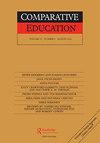Inclusion and social justice in neoliberal India: examining the world’s largest public-funded programme for private education
IF 3.7
1区 教育学
Q1 EDUCATION & EDUCATIONAL RESEARCH
引用次数: 2
Abstract
ABSTRACT A provision of India’s Right to Education Act requires private schools to enrol 25% of children from ‘disadvantaged’ and ‘economically weaker’ backgrounds. Described as a unique public-private partnership, this policy has been widely debated for its promotion of private actors in ensuring equity and access to education. Within this controversial policy field is the increasing involvement of non-governmental organisations (NGOs) that aim to reform the education sector through neoliberal logics and privatisation in India and globally. We analyse documents and reports from two NGOs and pay special attention to the discursive strategies employed. Among them, we find that establishing neutral expertise, legitimising educational privatisation, and promoting assimilationist pedagogy are noteworthy practices. We contribute to the extant literature by illuminating how NGOs implement this controversial provision and negotiate tensions around their position within a neoliberal policy landscape, which embodies privatisation in education yet touts social justice and equality as its objectives.新自由主义印度的包容与社会正义:检视世界上最大的公共资助私立教育计划
印度《教育权法案》的一项规定要求私立学校招收25%来自“弱势”和“经济较弱”背景的儿童。该政策被描述为一种独特的公私伙伴关系,因其促进私人行为者确保公平和获得教育而受到广泛讨论。在这个有争议的政策领域,非政府组织(ngo)越来越多地参与进来,旨在通过印度和全球的新自由主义逻辑和私有化改革教育部门。我们分析了两个非政府组织的文件和报告,并特别关注所使用的话语策略。其中,我们发现建立中立的专业知识,使教育私有化合法化,促进同化主义教学法是值得注意的做法。我们通过阐明非政府组织如何实施这一有争议的条款,并在新自由主义政策环境中围绕其立场进行谈判,从而为现有文献做出贡献。新自由主义政策环境体现了教育私有化,但却将社会正义和平等作为其目标。
本文章由计算机程序翻译,如有差异,请以英文原文为准。
求助全文
约1分钟内获得全文
求助全文
来源期刊

Comparative Education
EDUCATION & EDUCATIONAL RESEARCH-
CiteScore
7.40
自引率
21.20%
发文量
35
期刊介绍:
This international journal of educational studies presents up-to-date information with analyses of significant problems and trends throughout the world. Comparative Education engages with challenging theoretical and methodological issues - and also considers the implications of comparative studies for the formation and implementation of policies - not only in education but in social, national and international development. Thus it welcomes contributions from associated disciplines in the fields of government, management, sociology - and indeed technology and communications - as these affect educational research and policy decisions.
 求助内容:
求助内容: 应助结果提醒方式:
应助结果提醒方式:


